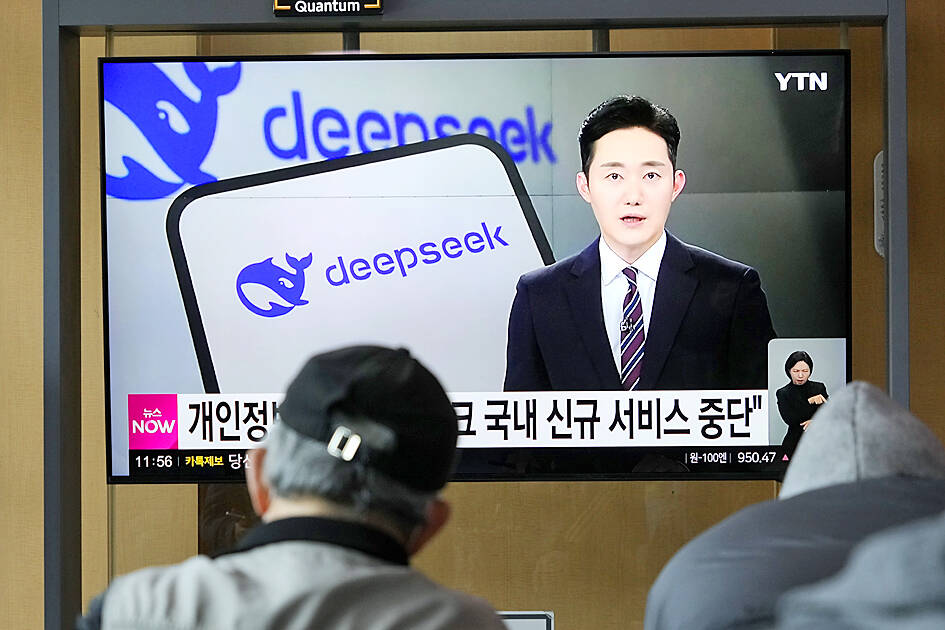Chinese artificial intelligence (AI) app DeepSeek would not be available to download in South Korea pending a review of its handling of user data, Seoul authorities said yesterday.
DeepSeek’s R1 chatbot stunned investors and industry insiders with its ability to match the functions of its Western rivals at a fraction of the cost, but a number of countries have questioned its storage of user data, which the firm says is collected in “secure servers located in the People’s Republic of China.”
The South Korean Personal Information Protection Commission said that DeepSeek would no longer be available for download until a review of its personal data collection practices was carried out.

Photo: AP
The Chinese AI firm has “acknowledged that considerations for domestic privacy laws were somewhat lacking,” the data protection agency said.
It assessed that bringing the app into line with local privacy laws “would inevitably take a significant amount of time,” it added.
“To prevent further concerns from spreading, the commission recommended that DeepSeek temporarily suspend its service while making the necessary improvements,” it said.
DeepSeek has “accepted” that proposal, it added.
The app was removed from local app stores on Saturday at 6pm and remains unavailable. It can still be used by those who have already downloaded the app.
The commission said it “strongly advised” people to “use the service with caution until the final results are announced.”
That included “refraining from entering personal information into the DeepSeek input field,” it said.
Analyst Youm Heung-youl said that the firm has yet to lay out a privacy policy “specifically tailored” for users in South Korea.
“It has on the other hand disclosed a privacy policy for the EU and certain other countries, stating that it complies with the domestic laws of those nations,” said Youm, a data security professor at Soonchunhyang University.
Asked about the app’s removal, Beijing yesterday said that it asked Chinese firms to run their “overseas operations on the basis of strict abidance by local laws and regulations.”
Chinese Ministry of Foreign Affairs spokesman Guo Jiakun (郭嘉昆) also urged “relevant countries” to “avoid taking measures that overstretch the concept of security or politicize trade and technology issues.”
This month, a slew of South Korean government ministries and police said they blocked access to DeepSeek on their computers.
Italy has also launched an investigation into DeepSeek’s R1 model and blocked it from processing Italian users’ data.
Australia has banned DeepSeek from all government devices on the advice of security agencies.
US lawmakers have also proposed a bill to ban DeepSeek from being used on government devices over concerns about user data security.
In response to the bans, the Chinese government has insisted it “has never and will never require enterprises or individuals to illegally collect or store data.”

MORE VISITORS: The Tourism Administration said that it is seeing positive prospects in its efforts to expand the tourism market in North America and Europe Taiwan has been ranked as the cheapest place in the world to travel to this year, based on a list recommended by NerdWallet. The San Francisco-based personal finance company said that Taiwan topped the list of 16 nations it chose for budget travelers because US tourists do not need visas and travelers can easily have a good meal for less than US$10. A bus ride in Taipei costs just under US$0.50, while subway rides start at US$0.60, the firm said, adding that public transportation in Taiwan is easy to navigate. The firm also called Taiwan a “food lover’s paradise,” citing inexpensive breakfast stalls

TRADE: A mandatory declaration of origin for manufactured goods bound for the US is to take effect on May 7 to block China from exploiting Taiwan’s trade channels All products manufactured in Taiwan and exported to the US must include a signed declaration of origin starting on May 7, the Bureau of Foreign Trade announced yesterday. US President Donald Trump on April 2 imposed a 32 percent tariff on imports from Taiwan, but one week later announced a 90-day pause on its implementation. However, a universal 10 percent tariff was immediately applied to most imports from around the world. On April 12, the Trump administration further exempted computers, smartphones and semiconductors from the new tariffs. In response, President William Lai’s (賴清德) administration has introduced a series of countermeasures to support affected

CROSS-STRAIT: The vast majority of Taiwanese support maintaining the ‘status quo,’ while concern is rising about Beijing’s influence operations More than eight out of 10 Taiwanese reject Beijing’s “one country, two systems” framework for cross-strait relations, according to a survey released by the Mainland Affairs Council (MAC) on Thursday. The MAC’s latest quarterly survey found that 84.4 percent of respondents opposed Beijing’s “one country, two systems” formula for handling cross-strait relations — a figure consistent with past polling. Over the past three years, opposition to the framework has remained high, ranging from a low of 83.6 percent in April 2023 to a peak of 89.6 percent in April last year. In the most recent poll, 82.5 percent also rejected China’s

PLUGGING HOLES: The amendments would bring the legislation in line with systems found in other countries such as Japan and the US, Legislator Chen Kuan-ting said Democratic Progressive Party (DPP) Legislator Chen Kuan-ting (陳冠廷) has proposed amending national security legislation amid a spate of espionage cases. Potential gaps in security vetting procedures for personnel with access to sensitive information prompted him to propose the amendments, which would introduce changes to Article 14 of the Classified National Security Information Protection Act (國家機密保護法), Chen said yesterday. The proposal, which aims to enhance interagency vetting procedures and reduce the risk of classified information leaks, would establish a comprehensive security clearance system in Taiwan, he said. The amendment would require character and loyalty checks for civil servants and intelligence personnel prior to